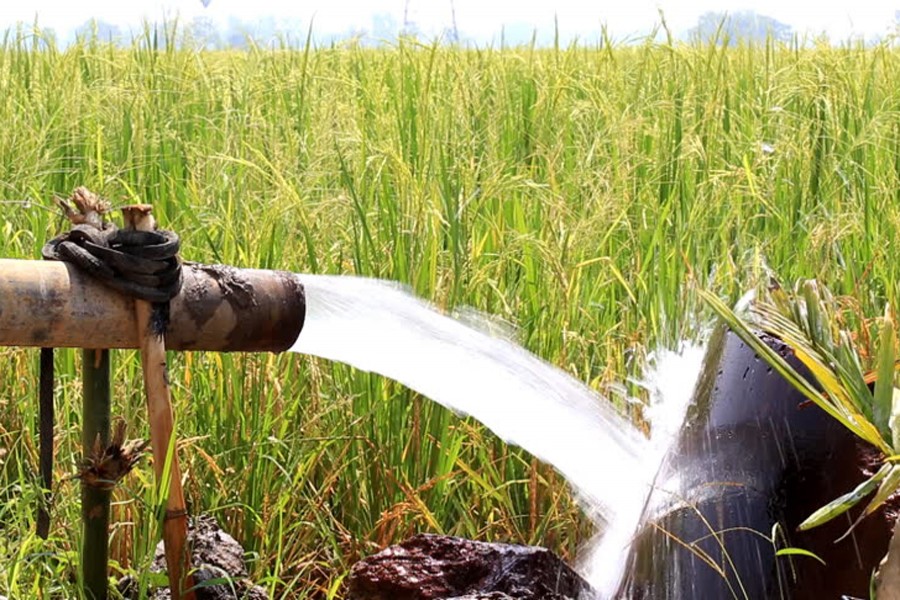RANGPUR, Apr 02 (BSS): The government has provided irrigation facilities to over 0.85 million hectares of land for cultivation of different crops in Rangpur agriculture region to increase food output during this Rabi season.
"Using irrigation facilities, farmers have cultivated Boro rice on 0.54 million hectares of land and other Rabi crops like wheat, potato, maize, mustard and vegetables on 3.11 lakh hectares of land," said Horticulture Specialist of DAE at its regional office Khondker Md. Mesbahul Islam.
Bangladesh Agriculture Development Corporation (BADC), Barind Multipurpose Development Authority (BMDA), Teesta Barrage Project (TBP) of Water Development Board (WDB), Rural Electrification Board (REB) and Northern Electricity Supply Company Limited (NESCO) are comprehensively providing irrigation facilities.
"The farmers are irrigating crop fields on 0.85 million hectares of land using over 0.23 million irrigation pumps including 2,810 deep tube wells (DTWs), 0.23 million shallow tube-wells (STWs), 570 low lift pumps (LLPs) and 512 other irrigation pumps," Mr Islam said.
Of them, electricity-run 2,747 DTWs, 71,452 STWs and 29 LLPs, diesel-run 33 DTWs, 1,61,868 STWs and 526 LLPs, solar power-run 30 DTWs, 99 STWs and 15 LLPs and 512 other irrigation pumps are irrigating croplands.
REB Superintending Engineer at Rangpur Zonal Office Manabendra Lal Mustafi said farmers are getting irrigation facilities from 48,044 irrigation pumps being run with electricity being supplied by REB in Rangpur agriculture region.
"The farmers are getting bills at only Tk 3.82 per unit for using electricity being provided by Palli Bidyut Samities (PBS) of REB to operate irrigation pumps for irrigation to enhance food production at reduced costs," he added.
Executive Engineer of BMDA Md Nur Islam said BMDA has put 950 DTWs and eight LLPs in operation to provide irrigation facilities to 29,096 hectares of land during this Rabi season in Nilphamari and Rangpur districts under Rangpur zone alone.
The BMDA is providing irrigation to 19,633 hectares of land for farming Boro rice, 470 hectares for wheat, 4,830 hectares for potato, 1,748 hectares for maize, 385 hectares for mustard and 2,030 hectares for other crops.
"The farmers are getting irrigation facilities at Tk 110 as surcharge for per hour using digitised prepaid cards from DTWs being managed BMDA in these two districts like other three districts of Rangpur agriculture region," Nur added.
Principal Extension Officer of WDB here Agriculturist Md. Abdul Hakim said the TBP is providing irrigation to 30,500 hectares of land for Boro rice cultivation in Rangpur and Nilphamari districts under Rangpur agriculture region this season.
"The farmers are paying Taka 480 per acre of land for cultivation of Boro rice and other crops round the year," Hakim said adding that the TBP is also providing irrigation to 10,000 hectares of land for Boro rice cultivation in nearby Dinajpur district.
Assistant Engineer of BADC Shahe Amin said the organisation is providing irrigation facilities to 10,000 hectares of land with their 230 DTWs, 22 STWs and 13 LLPs through the farmers' groups on rental basis in Rangpur district alone this season.
Talking to the news agency, farmers Ahadul Islam and Afzal Hossain of village Tahirpur in Mithapukur upazila said they are cultivating Boro rice in one acre of sandy-loamy land each using irrigation water being supplied from DTW by BMDA.
"We are spending about Tk 2,100 per acre of land for cultivation of Boro rice while irrigation cost is much lower for cultivation of potato, vegetables, maize, aus rice and other crops using irrigation water of electricity-run DTW," Islam added.
Farmer Ariful Haque Batul of village Najirdigar in Rangpur said he is cultivating Boro rice and other crops in his 3.50 acres of land using own electricity-run irrigation pump.
Batul expects to spend Tk 3,000 per acre of his sandy land for cultivating Boro rice using his irrigation pump being run with the electricity getting from Rangpur PBS-1 of REB.
"Food production is consistently increasing at reduced costs to ensure food security with expansion of irrigation areas in last ten years making farm activities more profitable," said Deputy Director of the DAE at its regional office Md, Moniruzzaman.


